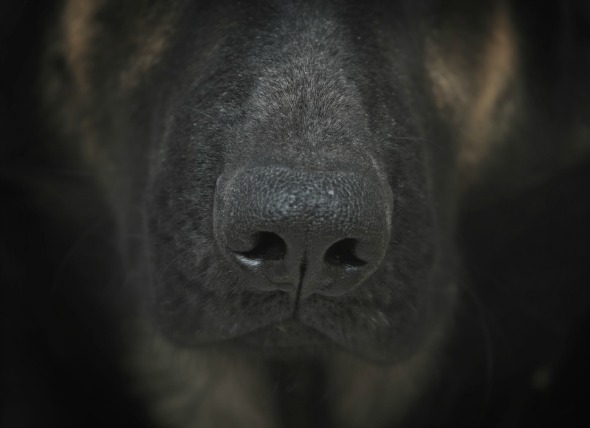

Vomiting is characterized by the contents of the stomach being ejected. Regurgitation, on the other hand, is the expulsion of the contents of the esophagus -- food that has not yet reached the stomach. Diseases of the stomach and upper intestinal tract are the primary implications in both cases. Secondary implications are diseases of other organs, which bring about an accumulation of toxic substances in the blood, stimulating the vomiting center in the brain.
Chronic vomiting can affect both dogs and cats. If you would like to learn more about how this condition affects cats, please visit this page in the PetMD health library.
Symptoms of vomiting include heaving, retching, and partially digested food coming up, along with a yellow fluid called bile. Regurgitating symptoms are fairly passive. The contents being expelled may be in predigested form, tubular in shape, and often covered with a slimy mucus.
A symptom that may be indicative of a more serious condition is blood in the vomit, which can signal an ulcer or cancer.
The biggest problem with determining the cause of vomiting, and devising a treatment plan, is that there are so many possibilities. Some of the possible causes for chronic vomiting are as follows:
There are so many possibilities for this condition that determining a cause for the vomiting or regurgitation may take some time. You will need to cooperate with your veterinarian in trying to pinpoint if there is anything related to your pet’s background or habits that might account for it.
To start, your veterinarian will need to differentiate between vomiting and regurgitation in order to determine whether the cause is gastric or non-gastric (i.e., based in the stomach, or not). You will want to pay close attention to the pattern of your pet's vomiting so you can give a thorough description of the symptoms, as well as how soon after eating the vomiting occurs. Your doctor will ask you to describe the appearance of the vomit, and what your pet looks like when it vomits.
If your pet is retching, and heaving from the belly, it is probably vomiting. The food that is in the vomit will be partially digested and somewhat liquid. A yellow fluid called bile will normally be present along with the expelled stomach contents. If the pet is regurgitating, your pet will lower its head and the food will be expelled without a lot of effort. The food will be undigested and probably will be tubular in shape, more solid than not. Often it is covered with a slimy mucus. Your pet may try to re-eat the regurgitated food. It is a good idea to keep a sample of the expelled content, so that when you take your pet to see the veterinarian, an examination can be made to determine whether the material is vomit or regurgitation, and what might be present in the contents.
Your veterinarian will need to know about your pet’s activities, habits, and surrounding environment, as well as what medicines your pet may be taking. Over the counter medications, such as aspirin and ibuprofen, can cause severe stomach ulcers in dogs. Factors that are significant and must be followed up on immediately are instances when the vomit looks like it has granules, like coffee grounds, in it. These granules are indicative of blood being present in the vomit. Fresh blood in the vomit will often indicate stomach ulcers or cancer. If your pet has a fever, a stomachache, jaundice, anemia, or masses in the stomach, your veterinarian will be able to make a more specific diagnosis.
Sometimes, something as simple as coughing will cause a pet to vomit. If this appears to be the case, the cause of the coughing will need to be investigated. Your doctor will look into your pet's mouth to see if a foreign object has become caught in the esophageal opening (back of the mouth), or, if indicated, an x-ray imaging may be used to determine if there is an object deeper in the esophagus, or in the stomach.
Once the cause of the vomiting is determined, your veterinarian will be able to come up with a course of treatment. Some possibilities:
Pay close attention to your pet so that you will be aware of its condition; whether it is improving or getting worse. If there is little or no improvement, you will need to consult with your veterinarian to see if your pet needs to go back for further evaluation. Do not experiment with medications or food without your veterinarian's approval, and remember that it is important that you follow through on your doctor's recommended treatment plan so that the illness can be thoroughly eliminated.
 Joint Cartilage Erosion in Dogs
Erosive, Immune-Mediated Polyarthritis in Dogs
Er
Joint Cartilage Erosion in Dogs
Erosive, Immune-Mediated Polyarthritis in Dogs
Er
 Genetic Liver Abnormality in Dogs
Hepatoportal Microvascular Dysplasia in Dogs
Hepa
Genetic Liver Abnormality in Dogs
Hepatoportal Microvascular Dysplasia in Dogs
Hepa
 Paralysis Due to Spinal Cord Lesion in Dogs
Schiff-Sherrington Phenomenon in Dogs
Schiff-Sher
Paralysis Due to Spinal Cord Lesion in Dogs
Schiff-Sherrington Phenomenon in Dogs
Schiff-Sher
 Runny Nose in Dogs
Nasal Discharge in Dogs
The throat is the end of
Runny Nose in Dogs
Nasal Discharge in Dogs
The throat is the end of
 Skin Mite Dermatitis in Dogs
Cheyletiellosis in Dogs
The Cheyletiella mite is
Skin Mite Dermatitis in Dogs
Cheyletiellosis in Dogs
The Cheyletiella mite is
Copyright © 2005-2016 Pet Information All Rights Reserved
Contact us: www162date@outlook.com